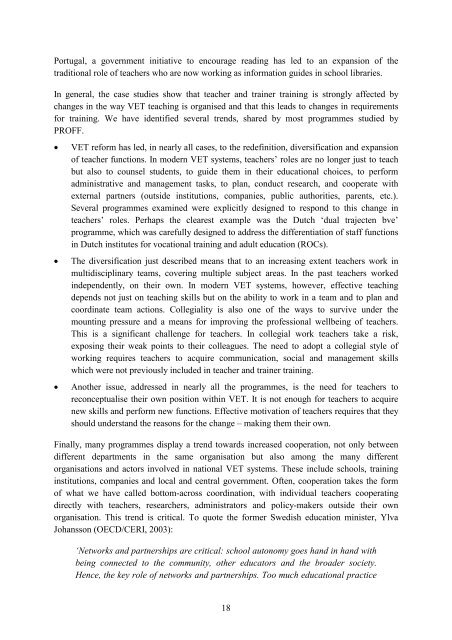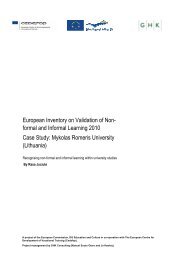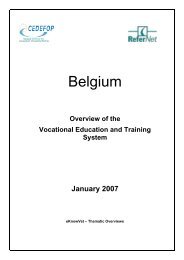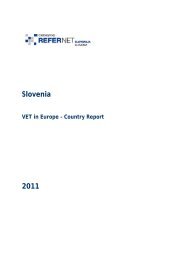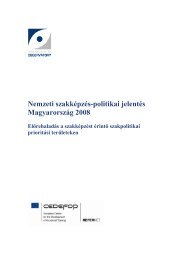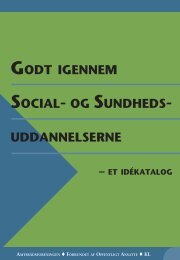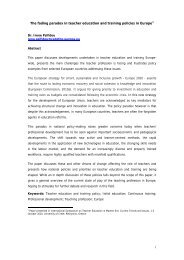PROFF – Professionalisation of VET teachers for the future - Europa
PROFF – Professionalisation of VET teachers for the future - Europa
PROFF – Professionalisation of VET teachers for the future - Europa
You also want an ePaper? Increase the reach of your titles
YUMPU automatically turns print PDFs into web optimized ePapers that Google loves.
Portugal, a government initiative to encourage reading has led to an expansion <strong>of</strong> <strong>the</strong>traditional role <strong>of</strong> <strong>teachers</strong> who are now working as in<strong>for</strong>mation guides in school libraries.In general, <strong>the</strong> case studies show that teacher and trainer training is strongly affected bychanges in <strong>the</strong> way <strong>VET</strong> teaching is organised and that this leads to changes in requirements<strong>for</strong> training. We have identified several trends, shared by most programmes studied by<strong>PROFF</strong>.• <strong>VET</strong> re<strong>for</strong>m has led, in nearly all cases, to <strong>the</strong> redefinition, diversification and expansion<strong>of</strong> teacher functions. In modern <strong>VET</strong> systems, <strong>teachers</strong>’ roles are no longer just to teachbut also to counsel students, to guide <strong>the</strong>m in <strong>the</strong>ir educational choices, to per<strong>for</strong>madministrative and management tasks, to plan, conduct research, and cooperate wi<strong>the</strong>xternal partners (outside institutions, companies, public authorities, parents, etc.).Several programmes examined were explicitly designed to respond to this change in<strong>teachers</strong>’ roles. Perhaps <strong>the</strong> clearest example was <strong>the</strong> Dutch ‘dual trajecten bve’programme, which was carefully designed to address <strong>the</strong> differentiation <strong>of</strong> staff functionsin Dutch institutes <strong>for</strong> vocational training and adult education (ROCs).• The diversification just described means that to an increasing extent <strong>teachers</strong> work inmultidisciplinary teams, covering multiple subject areas. In <strong>the</strong> past <strong>teachers</strong> workedindependently, on <strong>the</strong>ir own. In modern <strong>VET</strong> systems, however, effective teachingdepends not just on teaching skills but on <strong>the</strong> ability to work in a team and to plan andcoordinate team actions. Collegiality is also one <strong>of</strong> <strong>the</strong> ways to survive under <strong>the</strong>mounting pressure and a means <strong>for</strong> improving <strong>the</strong> pr<strong>of</strong>essional wellbeing <strong>of</strong> <strong>teachers</strong>.This is a significant challenge <strong>for</strong> <strong>teachers</strong>. In collegial work <strong>teachers</strong> take a risk,exposing <strong>the</strong>ir weak points to <strong>the</strong>ir colleagues. The need to adopt a collegial style <strong>of</strong>working requires <strong>teachers</strong> to acquire communication, social and management skillswhich were not previously included in teacher and trainer training.• Ano<strong>the</strong>r issue, addressed in nearly all <strong>the</strong> programmes, is <strong>the</strong> need <strong>for</strong> <strong>teachers</strong> toreconceptualise <strong>the</strong>ir own position within <strong>VET</strong>. It is not enough <strong>for</strong> <strong>teachers</strong> to acquirenew skills and per<strong>for</strong>m new functions. Effective motivation <strong>of</strong> <strong>teachers</strong> requires that <strong>the</strong>yshould understand <strong>the</strong> reasons <strong>for</strong> <strong>the</strong> change <strong>–</strong> making <strong>the</strong>m <strong>the</strong>ir own.Finally, many programmes display a trend towards increased cooperation, not only betweendifferent departments in <strong>the</strong> same organisation but also among <strong>the</strong> many differentorganisations and actors involved in national <strong>VET</strong> systems. These include schools, traininginstitutions, companies and local and central government. Often, cooperation takes <strong>the</strong> <strong>for</strong>m<strong>of</strong> what we have called bottom-across coordination, with individual <strong>teachers</strong> cooperatingdirectly with <strong>teachers</strong>, researchers, administrators and policy-makers outside <strong>the</strong>ir ownorganisation. This trend is critical. To quote <strong>the</strong> <strong>for</strong>mer Swedish education minister, YlvaJohansson (OECD/CERI, 2003):‘Networks and partnerships are critical: school autonomy goes hand in hand withbeing connected to <strong>the</strong> community, o<strong>the</strong>r educators and <strong>the</strong> broader society.Hence, <strong>the</strong> key role <strong>of</strong> networks and partnerships. Too much educational practice18


